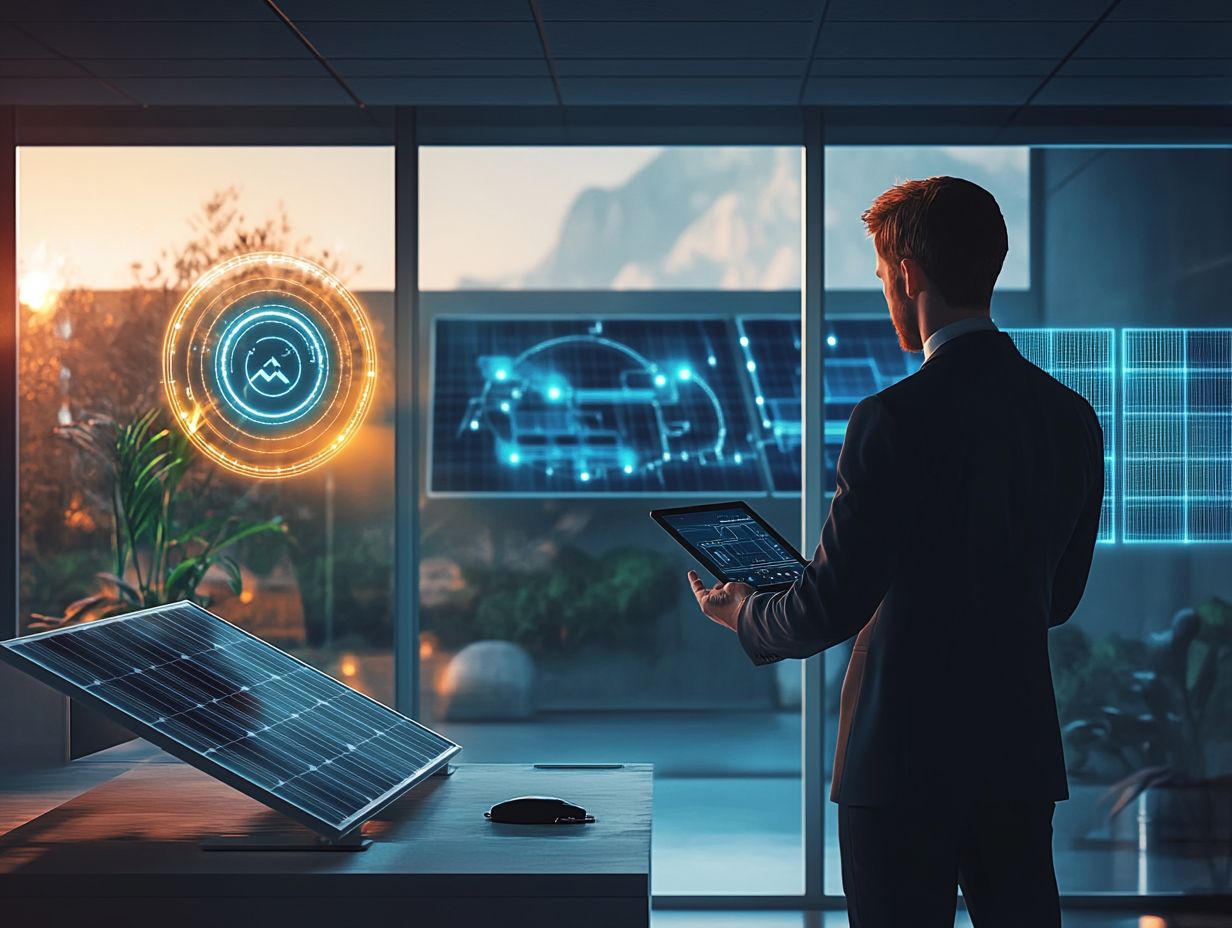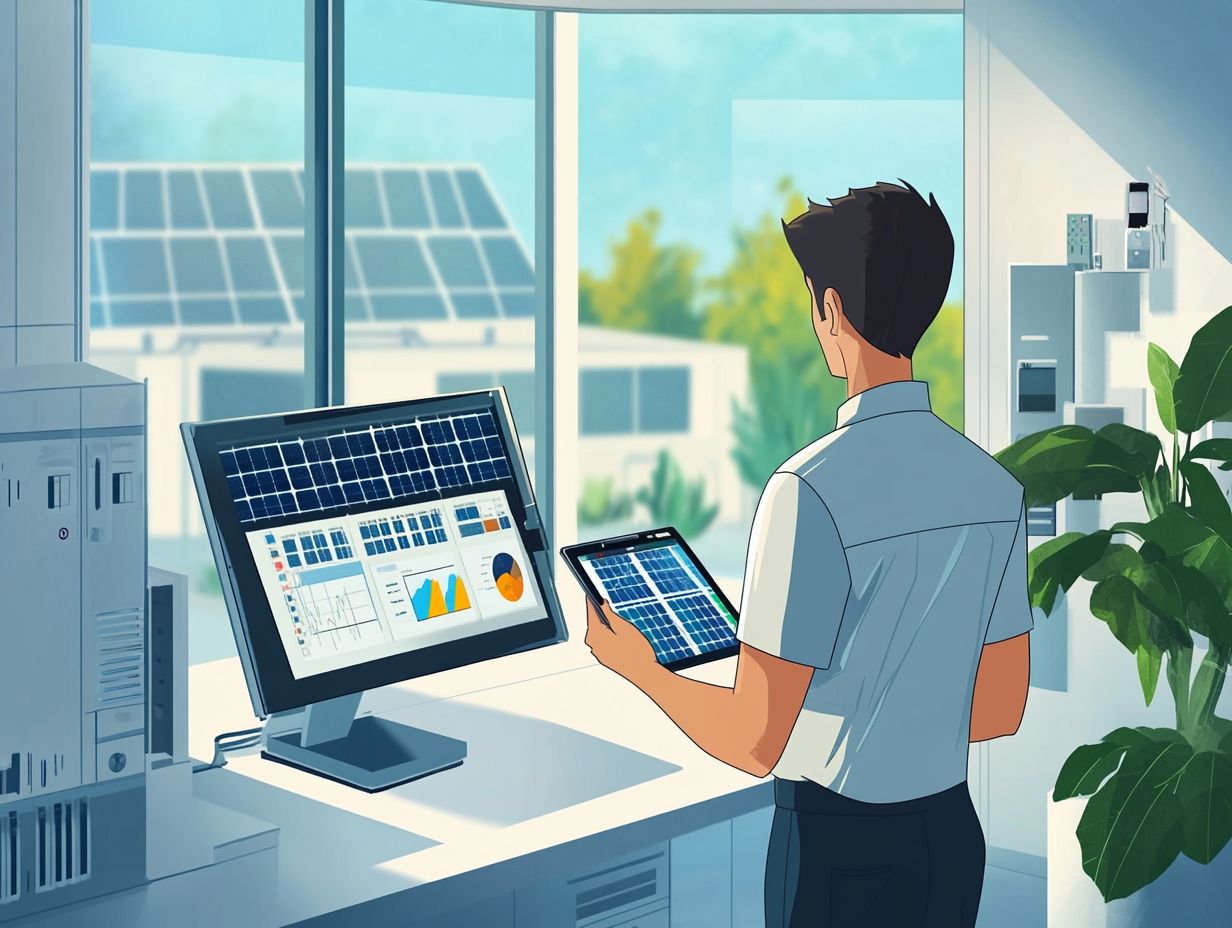The Future of Energy Auditing Technology
Energy auditing technology is revolutionizing how you and your business perceive and manage energy consumption.
These innovative tools offer detailed insights into your energy usage. They help you pinpoint inefficiencies and encourage more sustainable practices. Let s explore what energy auditing is and why it matters.
You ll find predictions for the future and valuable guidance on effective implementation. Discover how energy auditing technology can pave the way for a more efficient and sustainable world.
Contents
- Key Takeaways:
- Overview of Energy Auditing Technology
- Current State of Energy Auditing Technology
- Advancements in Energy Auditing Technology
- Predictions for the Future of Energy Auditing Technology
- Adopting and Implementing Energy Auditing Technology
- Frequently Asked Questions
- What is the future of energy auditing technology?
- Why is energy auditing technology important?
- How will energy auditing technology impact energy efficiency?
- What are some key features of future energy auditing technology?
- Will energy auditing technology become more accessible?
- Are there any concerns about the future of energy auditing technology?
Key Takeaways:

- Energy auditing technology is a vital tool for identifying energy consumption patterns and implementing energy-saving measures.
- Advancements in energy auditing technology, such as smart meters and data analytics, are improving accuracy and efficiency.
- The future of energy auditing technology holds great potential for reducing energy waste, lowering costs, and promoting sustainable energy practices.
Overview of Energy Auditing Technology
Energy auditing technology optimizes energy consumption. It boosts operational efficiency in sectors like oil and gas.
This cutting-edge technology uses advanced methods to perform in-depth data analysis. By doing so, it gives organizations the power to detect revenue anomalies and adopt effective risk reduction strategies.
Energy audits are crucial for companies that want to save costs and practice sustainability. This is particularly true for those working with Grant Thornton and experts like Gerrad Heep and Bryan Benoit.
Definition and Purpose
Energy auditing is your pathway to a meticulous examination of energy consumption within your facility. It allows you to uncover opportunities for enhancing efficiency and realizing cost savings.
This process reveals areas where energy is being squandered. It also provides actionable insights that can lead to significant reductions in operational expenses.
By undertaking this comprehensive evaluation, you can expect a favorable impact on your financial statements. Lower energy costs directly contribute to improving your bottom line.
With the aid of advanced technology and analytics, these audits can uncover innovative strategies for optimizing your energy usage.
Organizations like Grant Thornton play a pivotal role in guiding businesses through this auditing journey. They offer expertise that enhances operational efficiency while aligning with your sustainability objectives.
Current State of Energy Auditing Technology
The current landscape of energy auditing technology is characterized by the seamless integration of advanced tools and methodologies, providing invaluable insights into energy consumption patterns and identifying inefficiencies. To explore this further, consider reading about the future of home energy solutions.
This evolution gives you the power to make informed decisions, optimizing your energy usage for both economic and environmental benefits.
Existing Tools and Techniques
Current energy auditing practices leverage a range of advanced tools, such as drones and thermal imaging. These evaluate energy efficiency and pinpoint opportunities for enhancement.
These cutting-edge technologies streamline the assessment process and elevate the precision of data collection. By employing drones, you can effortlessly reach difficult areas, capturing high-resolution images that reveal potential issues without invasive techniques.
Simultaneously, thermal imaging provides a thorough analysis of heat flows. It effectively identifies insulation deficiencies and heat leaks that might easily escape notice.
Together, these tools significantly boost the overall effectiveness of your audit. They align seamlessly with the growing demand for efficiency in contemporary energy practices, facilitating substantial cost savings for both businesses and homeowners alike.
Advancements in Energy Auditing Technology

Advancements in energy auditing technology are swiftly reshaping the landscape. Cutting-edge innovations like machine learning, AI, and automation are paving the way for the future of energy-efficient home solutions, unleashing remarkable levels of efficiency and effectiveness.
Embracing these transformative tools allows you to elevate your energy management strategies to new heights.
New Technologies and Innovations
New tools for checking energy use, such as tools that predict future energy use and blockchain, significantly enhance transparency and data integrity in energy consumption assessments.
These advanced technologies have the potential to revolutionize auditing processes within the oil and gas industry, where precise energy management is paramount.
By harnessing tools that predict future energy use, you can forecast consumption patterns based on historical data. This enables you to make informed decisions and allocate resources efficiently.
Simultaneously, blockchain technology provides a secure, immutable ledger of transactions, ensuring all records remain accurate and tamper-proof.
This powerful combination aids in meeting regulatory compliance and fosters trust among stakeholders, ultimately encouraging more sustainable practices in energy usage.
Impact of Energy Auditing Technology on the Energy Industry
Energy auditing technology transforms the energy industry. It offers many benefits, including optimized efficiency and reduced costs.
However, it presents unique challenges that require careful navigation. Your ability to adapt and leverage these technologies will be crucial to thriving in this evolving landscape.
Benefits and Challenges
The benefits of energy auditing technology are strikingly clear: you can achieve increased efficiency and substantial cost savings.
However, be prepared for some challenges, such as the initial investment and the complexities of integration.
By adopting effective auditing strategies, you can significantly mitigate operational risks and elevate your overall performance. This smart approach boosts how you manage resources and strengthens your sustainability initiatives, creating a positive ripple effect on the environment.
Keep in mind that the upfront costs associated with this technology and potential disruptions during the integration process can present significant obstacles. You must tackle these challenges head-on to reap the long-term benefits, like optimized energy consumption and reduced operational costs yielding a compelling return on investment when handled with care.
Predictions for the Future of Energy Auditing Technology
Predictions for the future of energy auditing technology indicate a remarkable evolution, fueled by advancements in AI, blockchain, and energy-efficient technology.
This evolution will lead you to more efficient and effective auditing practices, transforming how energy consumption is monitored and managed.
Embracing these innovations will undoubtedly enhance your approach to energy auditing, setting new standards for accuracy and efficiency.
Potential Developments and Applications

Potential developments in energy auditing technology may soon feature enhanced applications of AI and IoT for real-time energy monitoring and analysis.
This integration holds remarkable potential for optimizing energy efficiency and reducing operational costs, fundamentally transforming your approach to energy management.
By leveraging tools that predict future energy use, you can anticipate your energy needs and proactively adjust consumption patterns, significantly minimizing waste.
These advancements can lead to new strategies in maintenance, ensuring that your equipment operates at peak performance and further driving down costs.
As energy companies adopt these cutting-edge tools, the chance for substantial improvements in sustainability practices becomes increasingly realistic, setting the stage for a greener future in energy production and consumption.
Adopting and Implementing Energy Auditing Technology
Ready to adopt energy auditing technology? Consider these key factors to maximize your investment today!
Think about the costs involved, the efficiency of the technology, and how well it aligns with your organization s goals. This thoughtful approach will ensure your investment truly pays off and supports your overarching objectives.
Considerations for Businesses and Consumers
Get ready to unlock savings and efficiency with tools for checking energy use! Evaluate energy efficiency, costs, and scalability before adopting new technology.
Also, assess how well the auditing software integrates with your existing systems. Seamless compatibility keeps your operations running smoothly.
Think about the long-term savings from improved energy efficiency. These savings can offset your initial investment.
Don t forget to consider future upgrades to meet changing energy standards. This foresight protects you from becoming outdated.
Understanding the full benefits, such as better performance and lower environmental impact, helps you make informed decisions.
Frequently Asked Questions
What is the future of energy auditing technology?
The future of energy auditing tools looks bright and is always changing. Advances, particularly the role of smart tech in energy audits, make audits more accurate, efficient, and accessible.
Why is energy auditing technology important?

This technology helps identify and analyze energy use in buildings. It provides valuable data for improving energy efficiency.
How will energy auditing technology impact energy efficiency?
These tools will greatly enhance energy efficiency. They pinpoint energy waste, leading to targeted solutions and savings.
What are some key features of future energy auditing technology?
Future tools are expected to include real-time energy monitoring and automated data analysis. They may also use artificial intelligence to provide better results.
Will energy auditing technology become more accessible?
Yes, these tools are becoming available to more users. Advances in mobile tech allow remote energy audits, making them easier for everyone.
Are there any concerns about the future of energy auditing technology?
Concerns include data privacy, security, and the costs of new technology. However, strict regulations and ongoing improvements are addressing these issues.






